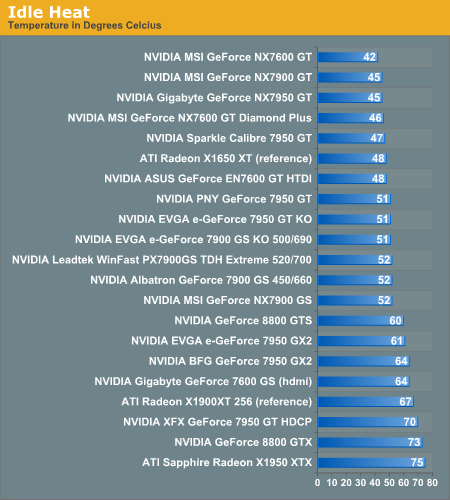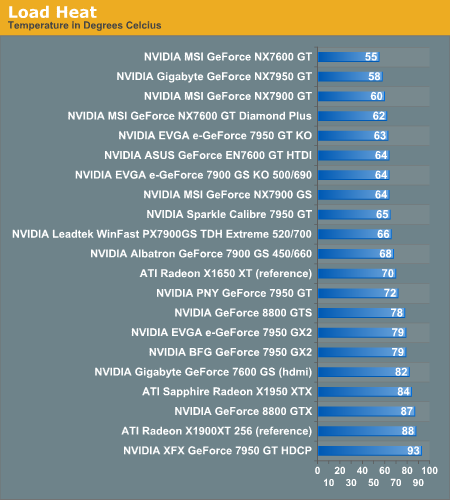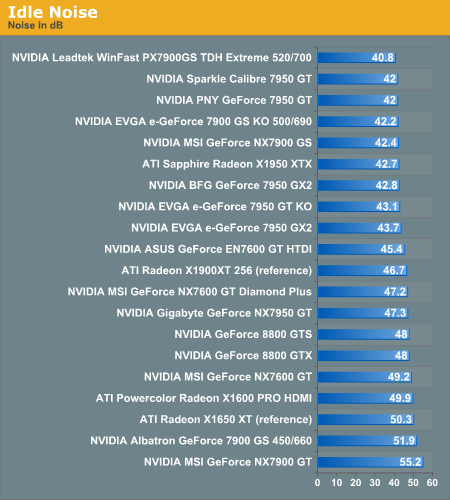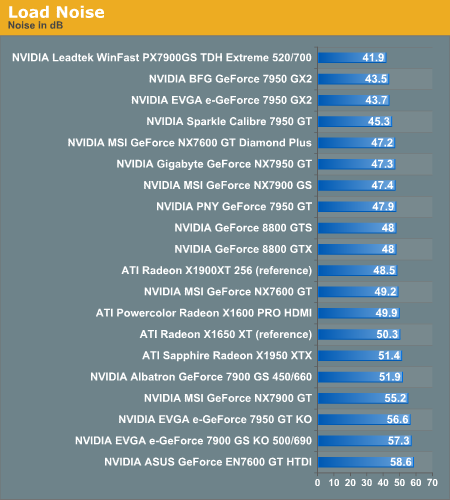NVIDIA and ATI HDCP Compatible Graphics Cards Roundup
by Josh Venning on November 16, 2006 12:00 AM EST- Posted in
- GPUs
Heat Levels
Heat and noise levels are related to power requirements, but we still wanted to see what kind of heat levels we would see with each of these cards during operation. We tested this in much the same way as in our power consumption tests. For the heat tests, we used ATI Tool, specifically the "scan for artifacts" function, which causes the GPU to continually draw a fuzzy cube in order to stress the card. After five minutes of stress testing, we then take the heat reading of the die through the software. We also take heat readings while the system is idle for reference.


We found that NVIDIA did a little better in general at dissipating heat, with the exception of the silent XFX GeForce 7950 GT which saw the highest heat levels of the bunch, including even the 8800 GTX. This makes sense considering the card has no fan and instead uses a large passive heat sink to cool it down. The silent Gigabyte 7600 GS also saw high heat levels for the same reason. The larger-than-usual heat sink on the MSI NX7600 GT (non HDMI) seemed to do a good job at cooling the GPU, as this was one of our coolest running cards. Heat levels are something to consider if you plan on overclocking your card, if you are in a hot environment, or if you have poor case circulation. Under these conditions, active cooling solutions are generally preferrable.
Noise
Of more importance for these particular cards is the amount of noise they generate. Excess noise from GPU fans can be a hindrance when putting together a system that is as quiet running as possible for a home theater setup. To test noise we took the dB level of the room with the system off to determine the ambient noise level; this was 38.1 dB. We then took dB readings of the cards while running a stress test (the same as in our heat level tests) to determine how much noise the cards made during operation. These are our results.


The ASUS EN7600 GT is particularly noisy. When the fan kicks in, it makes a much louder whine than it does when the system is idle. The Sapphire X1950 XTX was also fairly noisy once it got hot and the fan kicked in, but it seems to only speed up in short intervals. The EVGA 7900 GS KO also saw a high noise level under stress. We found that the EVGA and BFG 7950 GX2s both ran pretty quietly considering their performance, which is a nice feature of these cards. Of course the silent Gigabyte 7600 GS as well as the XFX 7950 GT HDCP would be good choices if you were looking for a card with zero noise, but it's especially nice having completely silent operation with a higher performance card like the 7950 GT. Because the noise level of these cards was 0Db, they were not included in the graphs, but the noise level of the CPU will still be a factor for HTPC users. Note that you will almost certainly want a case that provides sufficient cooling if you choose to run either of these fanless cards.
Heat and noise levels are related to power requirements, but we still wanted to see what kind of heat levels we would see with each of these cards during operation. We tested this in much the same way as in our power consumption tests. For the heat tests, we used ATI Tool, specifically the "scan for artifacts" function, which causes the GPU to continually draw a fuzzy cube in order to stress the card. After five minutes of stress testing, we then take the heat reading of the die through the software. We also take heat readings while the system is idle for reference.


We found that NVIDIA did a little better in general at dissipating heat, with the exception of the silent XFX GeForce 7950 GT which saw the highest heat levels of the bunch, including even the 8800 GTX. This makes sense considering the card has no fan and instead uses a large passive heat sink to cool it down. The silent Gigabyte 7600 GS also saw high heat levels for the same reason. The larger-than-usual heat sink on the MSI NX7600 GT (non HDMI) seemed to do a good job at cooling the GPU, as this was one of our coolest running cards. Heat levels are something to consider if you plan on overclocking your card, if you are in a hot environment, or if you have poor case circulation. Under these conditions, active cooling solutions are generally preferrable.
Noise
Of more importance for these particular cards is the amount of noise they generate. Excess noise from GPU fans can be a hindrance when putting together a system that is as quiet running as possible for a home theater setup. To test noise we took the dB level of the room with the system off to determine the ambient noise level; this was 38.1 dB. We then took dB readings of the cards while running a stress test (the same as in our heat level tests) to determine how much noise the cards made during operation. These are our results.


The ASUS EN7600 GT is particularly noisy. When the fan kicks in, it makes a much louder whine than it does when the system is idle. The Sapphire X1950 XTX was also fairly noisy once it got hot and the fan kicked in, but it seems to only speed up in short intervals. The EVGA 7900 GS KO also saw a high noise level under stress. We found that the EVGA and BFG 7950 GX2s both ran pretty quietly considering their performance, which is a nice feature of these cards. Of course the silent Gigabyte 7600 GS as well as the XFX 7950 GT HDCP would be good choices if you were looking for a card with zero noise, but it's especially nice having completely silent operation with a higher performance card like the 7950 GT. Because the noise level of these cards was 0Db, they were not included in the graphs, but the noise level of the CPU will still be a factor for HTPC users. Note that you will almost certainly want a case that provides sufficient cooling if you choose to run either of these fanless cards.










48 Comments
View All Comments
LoneWolf15 - Tuesday, November 21, 2006 - link
Behind Enemy Lines? Explains why Blu-Ray adoption is so slow.NullSubroutine - Friday, November 17, 2006 - link
I think ATi er AMD had been working on the drivers for GPU accelration for HD movies longer than Nvidia is all. You only have so much resources in a given department, it would make seense that Nvidia put more focus in other things (like Linux drives) where as Ati was working on this and Folding @ home stuff.dickie1900 - Friday, November 17, 2006 - link
Do you think the results will change for the 8800s when DX10 rolls out with Vista or are we going to have to wait for games to be developed that use some of the newer instructions?DigitalFreak - Friday, November 17, 2006 - link
I would doubt it. I don't believe Blu-Ray/HD-DVD decoding has anything to do with DirectX.DigitalFreak - Friday, November 17, 2006 - link
Dude, it's a unicorn. :-)
phusg - Friday, November 17, 2006 - link
First off, thanks for the great review.Why not? Many people just look at the graphs and this way they would miss out on the 2 quietest cards.
Also (unrelated), it's a shame there was no mention of AGP cards. I'm sure I'm not the only one looking to stretch the life of their AGP HTPC.
And one more thing (unrelated), aren't there initiatives that are looking to handle the HD decoding in software? I'd love a review of these. What is the slowest CPU you can decode HD content with?
mino - Wednesday, November 22, 2006 - link
I second that.EVERY noise measurement should include reference of the bacground (system without the thingie which noise one measures).
As those 0dB would would not be 0dB. There would be the noise of the system without the noise of the card - hence the bacground noise.
Try to consider that in the future. No much work required for MUCH information added.
Spoelie - Friday, November 17, 2006 - link
coreavc is the fastest h264 software decoder, no competitionTheir cpu-only implementation is most of the time faster than the competition WITH gpu support, but they're working on gpu support as well.
It is payware tho.
http://coreavc.corecodec.org/">http://coreavc.corecodec.org/
NullSubroutine - Friday, November 17, 2006 - link
I originally had written this up in response to an artical that MS Office has mandatory authentication checks when doing updates. However, I think the idea of what the "intellectual property" industry is putting consumers through is rediculous.....this just in, cars now 'phone home' to validate the vehicial is authentic prior to fixing factory installed parts.....refridgerator units must now be activated via phone call before the cooling units will work....lotion now comes with EULA, which is automatically agreed to at time of purchase (information is inside the bottle)....desk drawers will now automatically lock after free trial period has ended....fees must now be paid to bacteria colonies each time a user flushes the toilet....due to people stealing food, the price has increased 1000x, if the food is not authentic it will tell you, via voice, that your food is not real food, and where authentic food can be purchased if you give the food companies the information on where your not real food was purchased; when asked about the policy, supporters claimed that food was an optional luxery, paint companies now produce super ultra high quality paint products - but can only be applied with a special paint brush on special surface (microchips installed) or else the paint looks like normal paint - when cosumers were asked about the new paint they said it looked great but unless they wanted to buy all new everything, it was all meaningless...
shecknoscopy - Thursday, November 16, 2006 - link
Wow... the Blu-ray era's off to a stunning start, eh? No more complaining about the poor game options for the Wii launch, when the stunning new world of BLU-RAY is kicking off with "Click."
Lawdy, help us.
-Sheq